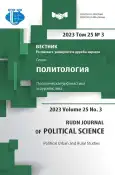Политическая и публично-правовая субъектность городских агломераций
- Авторы: Вульфович Р.М.1, Майборода В.А.1
-
Учреждения:
- Северо-Западный институт управления Российской академии народного хозяйства и государственной службы
- Выпуск: Том 25, № 3 (2023): Политическая урбанистика и руралистика
- Страницы: 539-552
- Раздел: ПОЛИТИЧЕСКАЯ УРБАНИСТИКА: ГОРОД ПЕРЕД НОВЫМИ ВЫЗОВАМИ
- URL: https://journal-vniispk.ru/2313-1438/article/view/322212
- DOI: https://doi.org/10.22363/2313-1438-2023-25-3-539-552
- EDN: https://elibrary.ru/TFKQYC
- ID: 322212
Цитировать
Полный текст
Аннотация
В связи с масштабами российской территории проблема развития системы расселения и городских агломераций как центров преимущественного развития обладает высокой степенью актуальности. Целью исследования является выявление возможностей и ограничений как правового, так и организационного характера для формирования систем управления городскими агломерациями. Проведя сравнительный анализ развития и функционирования данных систем в ряде стран с условиями, существующими в регионе Санкт-Петербурга, второго по численности населения города России, авторы впервые четко вычленили проблему развития городской агломерации, территория которой включает полностью или частично территории двух субъектов Российской Федерации: города федерального значения и окружающей его Ленинградской области. В обоих вариантах - агломерация радиусом 60 км и радиусом 120 км - определена допустимая с точки зрения российского законодательства и принципов рациональности, экономичности и эффективности, являющихся базовыми принципами современного управления, модель организации системы публичной власти для Санкт-Петербургской агломерации, способной сформировать оптимальное единообразное качество жизни на ее территории. Она не предусматривает институционализацию с созданием полной системы публичной власти для всей территории, а должна быть ориентирована на совместное выполнение общих для всей территории функций с включением в процесс всех уровней и органов публичной власти, ответственных за качество жизни на территории. Первые шаги в этом направлении предпринимаются обоими регионами на протяжении последних лет. Объединение Санкт-Петербурга и Ленинградской области в один субъект федерации, а также присоединение к городу части территории области пока не рассматриваются.
Об авторах
Ревекка Михайловна Вульфович
Северо-Западный институт управления Российской академии народного хозяйства и государственной службы
Автор, ответственный за переписку.
Email: vulfovich-rm@ranepa.ru
ORCID iD: 0000-0002-1303-9057
доктор политических наук, профессор кафедры государственного и муниципального управления
Санкт-Петербург, Российская ФедерацияВиктор Александрович Майборода
Северо-Западный институт управления Российской академии народного хозяйства и государственной службы
Email: victormaiboroda@yandex.ru
ORCID iD: 0000-0002-3439-1244
доктор юридических наук, судья областного суда в отставке, доцент кафедры правоведения
Санкт-Петербург, Российская ФедерацияСписок литературы
- Alekseev, S.S. (2010). Problems of Law theory. The main issues of the general theory of socialist law. Collected works, 3. Moscow: Statut Publishing (In Russian).
- Avakyan, S.A. (2021). Russian constitutional law. 2. Moscow, INFRA-M Publishing. (In Russian).
- Barber, B. (2013). If mayors ruled the world. Dysfunctional nations, rising cities. New Haven: Yale University Press.
- Bassens, D. et al. (2019). An Urban Studies Take on Global Urban Political Agency. In S. Oosterlynck et al. (Еds.), The city as global political actor (pp. 1–22). London: Routledge.
- Batty, M. (2013). The new science of cities. Cambridge Mass.: The MIT Press.
- Bratus, S.N. (1950). Subjects of civil law. Moscow: State Legal Publishing (In Russian).
- Bratus, S.N. (1984). Subjects of civil law. In Bratus, S.N. (Ed.). Soviet civil law. Moscow: State Legal Publishing (In Russian).
- Churkina, N., & Zaverskiy, S. (2017). Challenges of strong concentration in urbanization: The case of Moscow in Russia. Procedia Engineering, 198, 398–410. https://doi.org/10.1016/j.proeng.2017.07.095
- Derudder, B. (2022). Polycentric urban regions: Conceptualization, identification and implications. Regional Studies, 56(1), 1–6. https://doi.org/10.1080/00343404.2021.1982134 Ergen, M. (Ed.). (2018). Urban agglomerations. London: Intech Open.
- Fang, C., & Yu, D. (2020). The Proposed spatial configuration of China’s urban agglomerations is adopted in major national documents and master plans. In F. Chuangling & Yu. Danlin (Еds.), Chinas Urban Agglomerations. Singapore: Springer Nature.
- Fang, C., & Yu, D. (2017). Urban agglomeration: An evolving concept of an emerging phenomenon. Landscape and Urban Planning, 162, 126–136. https://doi.org/10.1016/j. landurbplan.2017.02.014
- Glaeser, E.L., Ponzetto, G.A. M., & Zou, Y. (2016). Urban networks: Connecting markets, people, and ideas. Papers in Regional Science, 95(1), Special Issue: Agglomerations and the Rise of Urban Network Externalities, 17–59.
- Haynes, K.E., & Stough, R.R. (2020). The rise of mega urban regions and the future of spatial organization. In E. Glaeser, K. Kourtit & P. Nijkamp (Еds.), Urban empires. Cities as global rulers in the new urban world. (pp. 117–128). Routledge.
- Hegel, G.W.F. (2007). Philosophy of law. Moscow: Book World Publishing (In Russian).
- Iering, R.F. (2006). The spirit of Roman law. St Petersburg: Law Center Press Publishing. (In Russian).
- Ivanov, K.A. & E. Marquart (Eds.). (2021). Report on the state of local self-government in the Russian Federation. Inter-municipal cooperation as a mechanism for managing urban agglomerations. Moscow: Prospect Publishing house (In Russian).
- Kafka, R. (Eds.). (2016). Metropolregionen — Kooperation und Wettbewerb in Deutschland und Europa. Stuttgart: Franz Steiner Verlag.
- Kant, I. (2007). The critique of practical reason. St Petersburg: Science Publishing.
- Kozlova, N.V. (2018). Abstract and concrete understanding of the subject, legal capacity, and civil legal relationship. In Civil law: modern problems of science, legislation, practice (pp. 306– 324). Moscow: Statut Publishing.
- Loibl, W., et al. (2018). Characteristics of urban agglomerations in different continents: History, patterns, dynamics, drivers and trends.In Urban Agglomerations (pp. 29–65). London: Intech Open.
- Maiboroda, V.A. (2022). Jurisdiction of legal acts of the federal territory’s public authorities adopted by agreement. Judge, 1, 51–56. (In Russian). https://doi.org/10.52433/18178170_202 2_01_51
- Otomo, A. (2021). Urban agglomerations in Japan. Quarterly Journal of Geography, 73, 108–123.
- Rozenblat, C. (2020). Extending the concept of city for delineating large urban regions (LUR) for the cities of the world. CYBERGEO. 954. https://doi.org/10.4000/cybergeo.35411
- Sulzer, J., & Desax, M. (2015). Stadtwerdung der Agglomeration. Die Suche nach einer neuen urbanen Qualität. Zürich: Schweizerischer Nationalfonds, Bern, und Verlag Scheidegger & Spiess, AG.
- Szczurek, T., & Bryczek-Wróbel, P. (2018). Crisis management model for large urban agglomerations. BiTP, 49(1), 102–110.
- Taylor, P.J. (2020). Promiscuous agglomerations towards integrating urban agglomerations with urban networks. In E. Glaeser, K. Kourtit & P. Nijkamp (Еds.), Urban empires. Cities as global rulers in the new urban world. Routledge.
- Zhao, Y., Zhang G., & Zhao, H. (2021). Spatial network structures of urban agglomeration based on the improved gravity model: A case study in China’s two urban agglomerations. Complexity. https://doi.org/10.1155/2021/6651444
Дополнительные файлы









